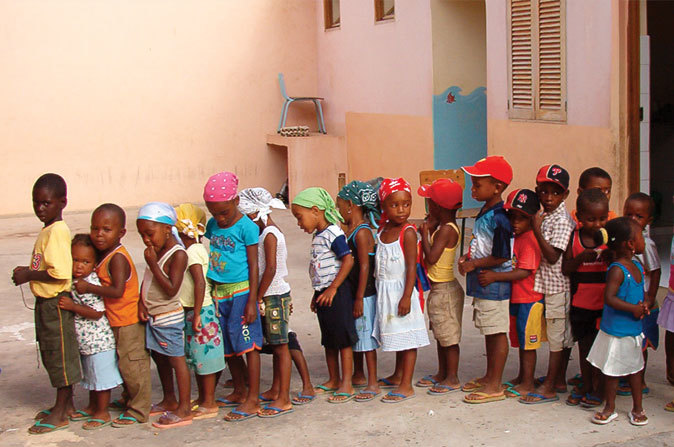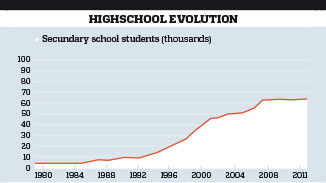Education & Research / Cape Verde
People come first
Education, public health care and combating poverty have been permanent public priorities for decades

Primary school students lining up for class in Cape Verde.
In 1975, the leaders of the newly independent Cape Verde found themselves with empty public coffers and an unemployment rate of over 50%. Illiteracy stood at 63% and droughts aggravated an already delicate situation. Without major resources, the country had to build a society from the ground up and survived on international aid for decades.
From the beginning, Cape Verde has steadfastly invested in its population, the country’s most valuable resource. Human capital was the only tool available to compensate for the archipelago’s natural deficiencies, and has been the country’s main focus throughout almost 40 years of independence. Nowadays, with almost 15,000 teachers in the country’s educational system, illiteracy has dropped to 17% and some 13,000 students are enrolled in the archipelago´s public and private universities. Another 5,000 young people are studying abroad, thanks to university cooperation agreements with Portugal, Brazil, Cuba, China, Russia and other countries.
Over the past four decades, Cape Verde´s leaders have striven to provide the country with a healthcare system that tends to its people’s needs. Child vaccination rates for diphtheria, whooping cough and tetanus have risen from 23% in the 80s to 90% at present. Over the same period mortality in children aged less than five years has dropped from 12% to close to 2%. Per capita public spending on healthcare has more than doubled this millennium, from less than $60 in 2000 to almost $150 in 2012.

With an unemployment rate of 16.8%, the government is also fighting a war on poverty. The poverty rate has more than halved from 49% in 1990, while per capita income has grown from $1,700 in 2000 to almost $3,700 at present. These advances go hand-in-hand with government programmes to ensure the welfare of the population, such as the ‘Home for All’ project. Conceived teopleo give the poorer classes access to affordable housing, the plan is implemented jointly with a housing insurance fund, providing surety for those who need to take out loans.
Thanks to these and other progressive social policies, Cape Verde is now a stable, peaceful democracy, another advantage when seeking international partners. Since the outbreak of the international financial crisis in 2008 there’s an increased pressure to control public expenses, but the underlying philosophy remains the same: In Cape Verde, people come first.
